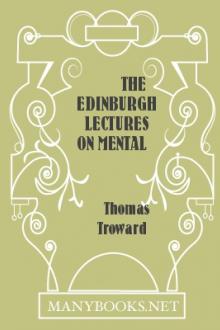The Edinburgh Lectures on Mental Science, Thomas Troward [novel books to read TXT] 📗

- Author: Thomas Troward
- Performer: -
Book online «The Edinburgh Lectures on Mental Science, Thomas Troward [novel books to read TXT] 📗». Author Thomas Troward
The initial step, then, consists in determining to picture the Universal Mind as the ideal of all we could wish it to be both to ourselves and to others, together with the endeavour to reproduce this ideal, however imperfectly, in our own life; and this step having been taken, we can then cheerfully look upon it as our ever-present Friend, providing all good, guarding from all danger, and guiding us with all counsel. Gradually as the habit of thus regarding the Universal Mind grows upon us, we shall find that in accordance with the laws we have been considering, it will become more and more personal to us, and in response to our desire its inherent intelligence will make itself more and more clearly perceptible within as a power of perceiving truth far beyond any statement of it that we could formulate by merely intellectual investigation. Similarly if we think of it as a great power devoted to supplying all our needs, we shall impress this character also upon it, and by the law of subjective mind it will proceed to enact the part of that special providence which we have credited it with being; and if, beyond the general care of our concerns, we would draw to ourselves some particular benefit, the same rule holds good of impressing our desire upon the Universal Subjective Mind. And if we realize that above and beyond all this we want something still greater and more enduring, the building-up of character and unfolding of our powers so that we may expand into fuller and yet fuller measures of joyous and joy-giving Life, still the same rule holds good: convey to the Universal Mind the suggestion of the desire, and by the law of relation between subjective and objective mind this too will be fulfilled. And thus the deepest problems of philosophy bring us back to the old statement of the Law:--Ask and ye shall receive, seek and ye shall find, knock and it shall be opened unto you. This is the summing-up of the natural law of the relation between us and the Divine Mind. It is thus no vain boast that Mental Science can enable us to make our lives what we will. We must start from where we are now, and by rightly estimating our relation to the Divine Universal Mind we can gradually grow into any conditions we desire, provided we first make ourselves in habitual mental attitude the person who corresponds to those conditions: for we can never get over the law of correspondence, and the externalization will always be in accord with the internal principle that gives rise to it. And to this law there is no limit. What it can do for us to-day it can do to-morrow, and through all that procession of to-morrows that loses itself in the dim vistas of eternity. Belief in limitation is the one and only thing that causes limitation, because we thus impress limitation upon the creative principle; and in proportion as we lay that belief aside our boundaries will expand, and increasing life and more abundant blessing will be ours.
But we must not ignore our responsibilities. Trained thought is far more powerful than untrained, and therefore the more deeply we penetrate into Mental Science the more carefully we must guard against all thoughts and words expressive of even the most modified form of ill-will. Gossip, tale-bearing, sneering laughter, are not in accord with the principles of Mental Science; and similarly even our smallest thoughts of good carry with them a seed of good which will assuredly bear fruit in due time. This is not mere "goodie, goodie," but an important lesson in Mental Science, for our subjective mind takes its colour from our settled mental habits, and an occasional affirmation or denial will not be sufficient to change it; and we must therefore cultivate that tone which we wish to see reproduced in our conditions whether of body, mind, or circumstance.
In these lectures my purpose has been, not so much to give specific rules of practice as to lay down the broad general principles of Mental Science which will enable the student to form rules for himself. In every walk in life, book knowledge is only a means to an end. Books can only direct us where to look and what to look for, but we must do the finding for ourselves; therefore, if you have really grasped the principles of the science, you will frame rules of your own which will give you better results than any attempt to follow somebody else's method, which was successful in their hands precisely because it was theirs. Never fear to be yourself. If Mental Science does not teach you to be yourself it teaches you nothing. Yourself, more yourself, and yet more yourself is what you want; only with the knowledge that the true self includes the inner and higher self which is always in immediate touch with the Great Divine Mind.
As Walt Whitman says:--"You are not all included between your hat and your boots."
The growing popularity of the Edinburgh Lectures on Mental Science has led me to add to the present edition three more sections on Body, Soul, and Spirit, which it is hoped will prove useful by rendering the principles of the interaction of these three factors somewhat clearer.
XIV. THE BODY.Some students find it difficult to realize that mental action can produce any real effect upon material substance; but if this is not possible there is no such thing as Mental Science, the purpose of which is to produce improved conditions both of body and environment, so that the ultimate manifestation aimed at is always one of demonstration upon the plane of the visible and concrete. Therefore to afford conviction of an actual connection between the visible and the invisible, between the inner and the outer, is one of the most important points in the course of our studies.
That such a connection must exist is proved by metaphysical argument in answer to the question, "How did anything ever come into existence at all?" And the whole creation, ourselves included, stands as evidence to this great truth. But to many minds merely abstract argument is not completely convincing, or at any rate it becomes more convincing if it is supported by something of a more concrete nature; and for such readers I would give a few hints as to the correspondence between the physical and the mental. The subject covers a very wide area, and the limited space at my disposal will only allow me to touch on a few suggestive points, still these may be sufficient to show that the abstract argument has some corresponding facts at the back of it.
One of the most convincing proofs I have seen is that afforded by the "biometre," a little instrument invented by an eminent French scientist, the late Dr. Hippolyte Baraduc, which shows the action of what he calls the "vital current." His theory is that this force, whatever its actual nature may be, is universally present, and operates as a current of physical vitality perpetually, flowing with more or less energy through every physical organism, and which can, at any rate to some extent, be controlled by the power of the human will. The theory in all its minutiae is exceedingly elaborate, and has been described in detail in Dr. Baraduc's published works. In a conversation I had with him about a year ago, he told me he was writing another book which would throw further light on the subject, but a few months later he passed over before it was presented to the world. The fact, however, which I wish to put before the reader, is the ocular demonstration of the connection between mind and matter, which an experiment with the biometre affords.
The instrument consists of a bell glass, from the inside of which is suspended a copper needle by a fine silken thread. The glass stands on a wooden support, below which is a coil of copper wire, which, however, is not connected with any battery or other apparatus, and merely serves to condense the current. Below the needle, inside the glass, there is a circular card divided into degrees to mark the action of the needle. Two of these instruments are placed side by side, but in no way connected, and the experimenter then holds out the fingers of both hands to within about an inch of the glasses. According to the theory, the current enters at the left hand, circulates through the body, and passes out at the right hand, that is to say, there is an indrawing at the left and a giving-out at the right, thus agreeing with Reichenbach's experiments on the polarity of the human body.
I must confess that, although I had read Dr. Baraduc's book, "Les Vibrations Humaines," I approached the instrument in a very sceptical frame of mind; but I was soon convinced of my error. At first, holding a mental attitude of entire relaxation, I found that the left-hand needle was attracted through twenty degrees, while the right-hand needle, the one affected by the out-going current, was repelled through ten degrees. After allowing the instrument to return to its normal equilibrium I again approached it with the purpose of seeing whether a change of mental attitude would in the least modify the flow of current. This time I assumed the strongest mental attitude I could with the intention of sending out a flow through the right hand, and the result as compared with the previous one was remarkable. The left-hand needle was now attracted only through ten degrees, while the right-hand one was deflected through something over thirty, thus clearly indicating the influence of the mental faculties in modifying the action of the current. I may mention that the experiment was made in the presence of two medical men who noted the movement of the needles.
I will not here stop to discuss the question of what the actual constitution of this current of vital energy may be--it is sufficient for our present purpose that it is there, and the experiment I have described brings us face to face with the fact of a correspondence between our own mental attitude and the invisible forces of nature. Even if we say that this current is some form of electricity, and that the variation of its action is determined by changes in the polarization of the atoms of the body, then this change of polarity is the result of mental action; so that the quickening or retarding of the cosmic current is equally the result of the mental attitude whether we suppose our mental force to act directly upon the current itself or indirectly by inducing changes in the molecular structure of the body. Whichever hypothesis we adopt the conclusion is the same, namely, that the mind has power to open or close the door to invisible forces in such a way that the result of the mental action becomes apparent on the material plane.
Now, investigation shows that the physical body, is a mechanism specially adapted for the transmutation of the inner or mental power into modes of external activity. We know from medical science that the whole body is traversed by a network of nerves which serve as the channels of communication between the indwelling spiritual ego,





Comments (0)